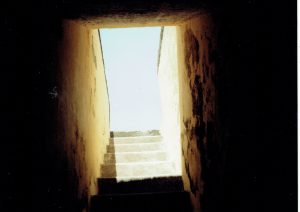“Litania” Interview by Yevgeny Kutik (March 8, 2019)
Written by Yevgeny Kutik Interviews Andreia Pinto Correia
Published by Meditations on Family Project
Why did you choose this photo in particular?
I took this particular photo in the 90’s while I was visiting my father on the island of Madeira. He had moved to the island for a period of several years to take over as president of the University and, due to those circumstances, I spent a good deal of time visiting the island during that decade. My father was born in Funchal, capital of the archipelago of Madeira, located in the Atlantic Ocean in front of Casablanca, Morocco. Madeira was discovered in the 15th century, and my father’s side of the family has lived there for many generations. It is a magical subtropical paradise.
Regarding the photo, I remember that day very vividly. I had been wandering through the Cidade Velha (Old City) in Funchal with my mother when we decided to enter the Fortaleza de São Tiago (Santiago fortress). It was a very hot and stifling day and was noon, the peak of the heat. The contrast between silvery light reflected in the surrounding ocean waters and the darkness of the fortress’s inside was really striking. We had lost ourselves in the underground labyrinthine corridors of the fortress, only to unexpectedly encounter the intense brightness of the light outside. That is the moment when I took that photo. I never forgot that instant, brief but dazzling, as though all my senses had been awakened. From darkness to light, from the cold of the underground to the wave of heat outside, from the earthy smells of the damp fortress’s caves to the fresh smells of the ocean around us…
What is it about Fernando Pessoa’s poetry, in general, that has so greatly inspired you?
I came from a family of writers and scholars, so naturally literature has been a vital part of my identity since I can remember. Fernando Pessoa (1888-1935) is considered the great poet of Portugal, as well as “the Lisbon poet” – although he did live in South Africa during his adolescence. Although my family has diverse origins, I am a true Lisboeta (or alfacinha) born in the heart of Lisbon. The Book of Disquiet (Livro do Desassossego) – from which I extracted my photo’s subtitle – had a tremendous impact on me during my early years. In fact, the book is seminal for many Portuguese people. It is one of those works to which I return continually, always finding a new angle, something that relates to my current existence. In a sense, The Book of Disquiet seems to grow old alongside me (or to put it more correctly, I have been growing up old alongside it).
Interestingly, The Book of Disquiet was written under one of Pessoa’s heteronyms, named Bernardo Soares, and it was reassembled by scholars during the 80’s, long time after his death. When I was choosing photos for this project, I kept coming back to this underground photo that I took in Madeira. And each time I looked at the photo I recalled those lines from Pessoa’s Litania in the Book of Disquiet:
Somos dois abismos – um poço fitando o Céu.
We are two abysses – a well staring at the Sky.
I realized then that I could not separate Fernando Pessoa’s text from my strong memory of that day at Cidade Velha in the company of my mother. The two were tied together forever in my memory and imagination.
How do you feel family has impacted your other compositions and/or you as an artist today?
As I mentioned earlier, my parents highly influenced my way of seeing art. Looking back, I understand how immensely privileged I was to grow up around them. My father was a Medievalist, a Professor of Literature, director of a center for research at the University of Lisbon. My mother was a German Literature Professor, responsible for the Portuguese translations of some of the world’s greatest writers, including Goethe, Robert Musil, Stefan Zweig, Thomas Mann, and Klaus Mann…
When I was a very young child, I remember listening to my mother’s readings of Goethe’s and my father’s telling of medieval tales before going to bed. How could I not be influenced? When I start to write a piece of music, I always draw inspiration from written text, writing down my impressions and mapping the narrative of the composition to come. Word, text, narrative: these are crucial elements in the construction of my musical compositions.
I love the chords in the piano, they evoke endless color. Were you trying to capture something aurally that we can relate to visually?
Thank you for that nice comment! Indeed, I love harmony and colors. Somehow I unconsciously paired the violin part with light, and the piano part with darkness. I only realized this when I was finishing the piece. The two instruments move along together, coexisting, but at distinct paces and dynamic levels. By repeating those low chords, the piano part sometimes resembles a distant bell. Thus the piano is “the underground”, portraying the darkness and the dampness of the fortress’s caves, and the violin part is connected to light and its silvery reflections, the outside world, and ultimately the infinite. At the end of the piece the violin fades away into a fragile ray of light, until it becomes only a reminiscence, a gesture, a suspended memory… Sadly my father passed away very suddenly right after I finished writing this short piece.
